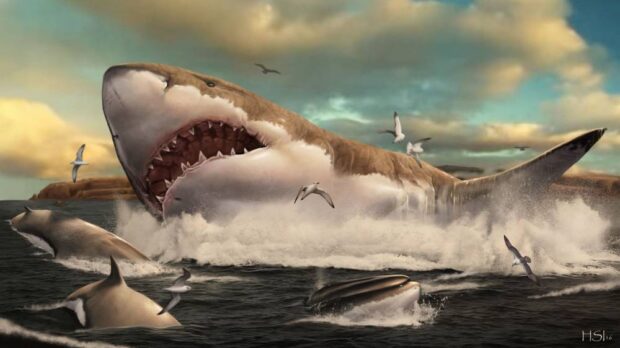‘The Meg’ shark was actually quite thin, scientists say

PREHISTORIC PREDATOR | This handout picture released by Metazoa Studio on Nov. 25, 2020, shows an artist’s impression of the prehistoric shark Otodus megalodon. The megalodon is known as one of the most fearsome creatures the world has ever known, a giant shark immortalized in the monster movie “The Meg.” (Photo from Agence France-Presse)
PARIS — The prehistoric megalodon (Otodus megalodon) is known as one of the most fearsome creatures the world has ever known, a horrifyingly giant shark immortalized in the monster movie “The Meg.”
But after reanalyzing the fossil evidence, scientists said on Monday they now think the shark was significantly thinner than previously thought.
While the 2018 B-movie starring Jason Statham depicted a megalodon preying on modern-day humans, the shark actually went extinct around 3.6 million years ago.
Previous research has suggested it could have been up to 20 meters (50 feet) long.
But size estimates have varied widely because they were based on the only remaining fossils of the shark, which are teeth and vertebrae.
Article continues after this advertisementAnd scientists had assumed that the megalodon had a similar stocky body shape to its modern descendant, the great white shark.
Article continues after this advertisementHowever, a better model may be the thinner mako shark, according to an international team of researchers behind a study in the journal Palaeontologia Electronica.
Slender, longer
“Our team reexamined the fossil record, and discovered the megalodon was more slender” than had been thought, University of California, Riverside biologist Phillip Sternes said in a statement.
But in bad news for Jason Statham in the next Meg movie, the shark actually may have been even longer than previously believed.
“It still would have been a formidable predator at the top of the ancient marine food chain, but it would have behaved differently based on this new understanding of its body,” Sternes added.
In better news for the hapless human victims in a possible future Meg movie, the megalodon “may not have been a powerful swimmer” compared to the great white shark, said study coauthor Kenshu Shimada, a paleobiologist at DePaul University in Chicago.
It also may have had to hunt less due to a longer digestive canal.
Better predator
This could also affect the mystery of the megalodon’s extinction.
It was previously theorized that the shark died off because there was less prey around. But its updated body image could point toward a different culprit.
“I believe there were a combination of factors that led to the extinction, but one of them may have been the emergence of the great white shark, which was possibly more agile, making it an even better predator than the megalodon,” Sternes said.
Shimada said that knowing the megalodon’s true shape would require finding a more complete skeleton.
“The fact that we still don’t know exactly how O. megalodon looked keeps our imagination going,” he added. —AFP